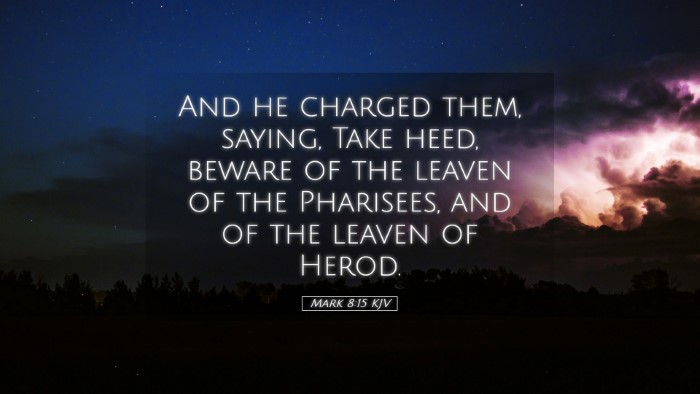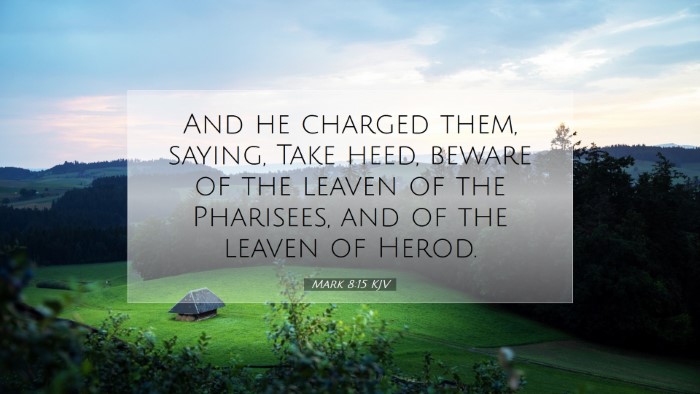Commentary on Mark 8:15
In the Gospel of Mark, chapter 8, verse 15, we encounter a critical moment wherein Jesus warns His disciples, saying:
"Watch out! Beware of the leaven of the Pharisees and the leaven of Herod."
This warning is profoundly significant, revealing layers of meaning that resonate with theological, pastoral, and scholarly pursuits. Below, we explore these insights through a synthesis of esteemed public domain commentaries.
The Contextual Setting
This warning from Jesus occurs soon after the miraculous feeding of the four thousand, which is significant in understanding the disciples' spiritual state. Having just witnessed plentiful provision, one might assume the disciples were filled with faith. However, their subsequent conversation reveals a lack of understanding, illustrating a critical theme in Mark’s Gospel regarding spiritual blindness and misunderstanding.
The Leaven Metaphor
The term "leaven" serves as a potent metaphor throughout scripture. Matthew Henry explains that leaven symbolizes various influences, particularly those that spread and permeate. Here, it represents:
- The Corruption of Teaching: The doctrine of the Pharisees is rooted in hypocrisy and legalism, which can subtly distort the understanding of God's law.
- Worldly Influence: Herod represents secular power and moral compromise; thus, Jesus warns against adopting worldly values into the Kingdom's framework.
Albert Barnes reinforces this spiritual perception by noting how leaven, although a small substance, can affect the entire batch of dough. Similarly, small corruptions in doctrine can lead to significant deviations in faith practice.
Spiritual Vigilance
Jesus' warning indicates the necessity for spiritual vigilance. Adam Clarke emphasizes the imperative for believers to be discerning and cautious regarding the influence of false teachings and worldly ideologies. This caution is not merely for the disciples of Christ in the first century but extends to all believers who aim to maintain the purity of the Gospel.
Historical Context of the Pharisees and Herod
Understanding the socio-religious backdrop in which Jesus spoke these words enhances the gravity of His warning:
- The Pharisees: Known for their strict adherence to the law, they often prioritized tradition above God's intention, thus suffocating the spirit of the law under layers of human interpretation.
- Herod: As a political leader, Herod’s reign was marked by moral laxity and hedonism. His influence represents the temptation to prioritize cultural acceptance over unwavering faith.
This context illustrates that both religious hypocrisy and secular opportunism can lead believers away from genuine faith and true obedience to God.
Implications for Discipleship
For pastors, theologians, and students of the Bible, this passage challenges us to reflect on the nature of our discipleship. It is a call to maintain a clear understanding of God’s Word untainted by human interpretation or cultural demands. Here are key implications:
- Awareness of Influences: Just as the disciples were cautioned, believers today must be vigilant against theological ideas and cultural norms that might compromise their faith.
- Critical Examination of Teachings: Engaging deeply with Scripture ensures that our beliefs are not swayed by the 'leaven' of contemporary thought or diluted theology.
- Community Accountability: In the pursuit of holiness, accountability in community serves as a safeguard against the encroachment of negative influences.
Theological Reflection
Theologically, this warning portrays a significant aspect of Christ's ministry—He is not merely concerned about behavior but about the heart and mind of His followers. His admonition invites us to consider how the teachings we accept shape our spiritual health and efficacy in ministry.
The Nature of Christ’s Concern
Jesus’ use of "leaven" reflects His desire for His followers to grasp the profound implications of their faith. Matthew Henry asserts that Christ’s admonition is a profound expression of His pastoral heart, guiding His disciples toward a vibrant, true understanding of their mission devoid of external corruption.
Concluding Insights
In conclusion, Mark 8:15 serves as a timeless exhortation for believers across generations. As we reflect on Jesus' warning, the task lies in striving for purity in doctrine and practice, remaining alert to the subtle influences that may undermine faith.
Application for Today’s Church
The contemporary Church must heed this warning, fostering environments where Scripture alone shapes beliefs and practices. This requires a commitment to:
- Continuous Learning: Embracing sound theology through study and community engagement.
- Courageous Leadership: Leading congregations with integrity, avoiding the pitfalls of both legalism and worldliness.
- Heartfelt Discipleship: Cultivating relationships that keep the body of Christ accountable and spiritually attuned to God’s Word.
Mark 8:15 is a reminder that faithful discipleship is a vigilant exercise in discernment, calling each believer to nurture their faith with intentionality and care.


